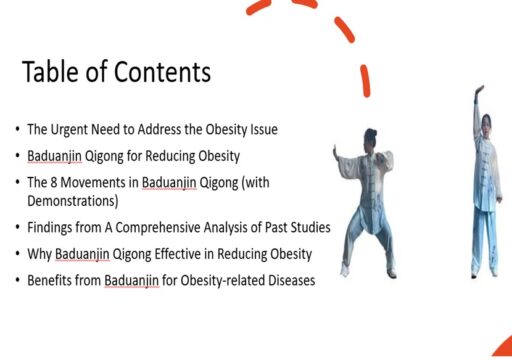Obesity, marked by excessive body fat accumulation, poses a significant public health threat. Currently, about 34% of the global population is overweight, leading to numerous health issues such as type 2 diabetes, stroke, hypertension, dyslipidemia, osteoarthritis, sleep apnea, and various cancers (e.g., breast, liver, gallbladder, and colon). Therefore, effective weight loss strategies are urgently needed.
Baduanjin Qigong, a low-intensity, long-term aerobic exercise, has been an effective obesity management technique for thousands of years. Consisting of eight simple exercises, it integrates body and mind through slow movements, concentration, deep breathing, and muscle stretching, making it suitable for individuals with obesity. It is also safe, with minimal adverse reactions.

A tutorial with details is available for ATCQA Members and Certified Instructors/Practitioners.
A comprehensive analysis of 10 past studies involving 420 participants revealed significant benefits of Baduanjin for weight management: it significantly reduced body weight, body mass index (BMI), waist Circumference and hip Circumference.
Baduanjin also positively affects conditions related to obesity by lowering levels of fasting plasma glucose (FPG), hemoglobin A1C (HbA1C), triglycerides (TGs), total cholesterol (TC), low-density lipoprotein (LDL), high-density lipoprotein (HDL), serum retinal-binding protein 4 (RBP4), serum leptin, and adiponectin.
In conclusion, Baduanjin Qigong is a beneficial, safe, and effective exercise for managing obesity and improving related health conditions, making it a valuable addition to weight loss strategies.